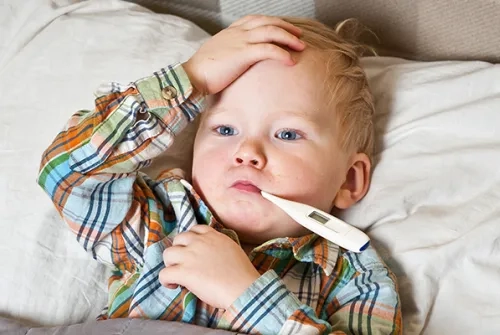Alo Yeditepe
Alo Yeditepe
High Fever in Children Article Series II
Watch Out for Persistent Fever That Lasts Longer Than 3 Days
Infections are the most important cause of high fever in children. Many infections, from influenza to pneumonia, from tonsillitis to meningitis, can increase fever. According to specialists, if the fever exceeds 3 days or if there are symptoms such as vomiting and diarrhea along with fever, a doctor should be consulted. Yeditepe University Kozyatağı Hospital Pediatric Health and Diseases and Newborn Specialist Prof. Dr. Filiz Bakar answered questions about fever.
In Which Children Is Fever More Common?
Especially children with weak immune systems, babies born prematurely, those with an allergic predisposition, and children with chronic kidney disease and diabetes are more susceptible to infections. Therefore, fever is more common in these children.
What Diseases Cause Fever?
The most important cause of fever is infectious diseases. Many infectious diseases, from otitis media to pneumonia, from urinary tract infections to meningitis, cause fever. Kawasaki syndrome may be considered if there is a fever and body rash that lasts longer than 5 days. If Kawasaki syndrome is not intervened in time, important problems occur in the heart vessels. Swelling in the joints along with fever may be a sign of joint and cardiac rheumatism. Cancer types such as leukemia and lymphoma should be suspected in long-lasting fevers of unknown origin. Abscesses that form inside the body, which are not noticed from the outside, may also be the underlying cause of long-lasting, resistant fever.
How to Understand the Cause of Fever?
It can be understood with a detailed examination by a physician. Since the most important cause of fever is infections, investigations focus primarily on this issue. After a detailed history taken from the patient, a physical examination is performed to determine whether there is an infection in the throat, ears, lungs, urinary tract, or intestines. Then, if deemed necessary, laboratory tests are performed. If suspected, the cause of the infection is tried to be found by diagnostic methods such as throat culture, urinalysis, blood analysis, chest X-ray, and stool analysis.
When Is a Fever Indicative of a Serious Condition?
In particular, persistent fever lasting longer than 3 days is an indication of a serious condition. If the child's general condition is bad along with fever, if he/she has a sick appearance, rashes on his/her body, excessive vomiting, and diarrhea accompanied by severe coughing and respiratory distress, a doctor should be consulted.
Dehydration (water loss) is very dangerous, even on its own it can cause the patient to enter into shock. Therefore, it is necessary to prevent children from becoming dehydrated during a fever. Especially babies cannot easily maintain the fluid balance in the body. With fever, their breathing may accelerate, and water vapor loss may occur from respiration and the skin. As the fluid in the body decreases, the fever rises. The younger the child or the later the intervention against fever, the more often dehydration occurs. 70% of our body is made up of water, and as the water ratio decreases, the healthy functioning of all cells and organs is impaired. In this case, the fever may get out of control, the infection may progress faster, and if the fever is very high, seizures may occur, especially in children under the age of 5.
How to Take Accurate Fever Measurement?
Fever can be measured from the mouth, forehead, ear canal, armpit, and rectum. Rectal measurement is a method that is not used much in practice because it disturbs the child. Armpit measurement in small babies and ear canal measurement in slightly older children are the methods preferred and recommended by physicians.
Does Fever Have a Special Significance in Babies?
Fever in the neonatal period, and especially in the first three months, is very important. It can be a symptom of much more serious ailments and severe infections. In this case, you should immediately go to the hospital. In addition, in the neonatal period, especially in the first days, children who cannot get enough breast milk and who are malnourished may have a fever due to a lack of fluid. Again, fever may occur in newborns due to thick clothes or the environment being too hot. However, all non-infectious fevers are short-lived and the general condition of the baby is very good. In the meantime, when fever is seen in babies born prematurely, it is necessary to be more careful and consult a doctor urgently.
Press Coverage: posta
About
Faculty and Year of Graduation:
Çukurova University Faculty of Medicine, 1992
”
See Also
- Does Breast Milk Protect Against Diseases?
- What is Heel Blood? Why is heel blood taken?
- How Can We Protect Children from COVID-19 Coronavirus?
- Special Care for Premature Babies
- What is the Goal in Newborn Intensive Care Treatment?
- Set the Rules from the Beginning!
- What is a Premature Baby and How to Feed it?
- It is Possible to Protect Children From Diseases with Simple Precautions
- Preschool Health Checks Increase Socialization and Success
- Ten Hints for Providing Care for Premature Babies
- Are Pre-School Health Checks Done?
- Keep It Away From Packaged Products To Strengthen Children's Immunity
- ‘Hand, foot, mouth disease’ Warning from the specialist of the subject: "It is more Common in Children Going to the Pool in Summer!”
- 648 Grams Born Baby “Umut” Succeeded in Clinging to Life
- Notice the Dangers in the School Bag!
- How Should the Development of a Baby Be?
- High Fever in Children
- Breastfed Babies Have Lower Blood Pressure, and Their Hearts are Healthier
Alo Yeditepe




